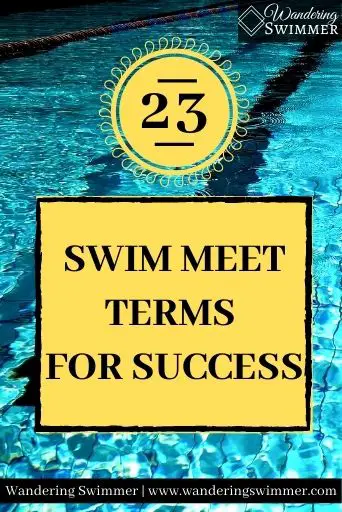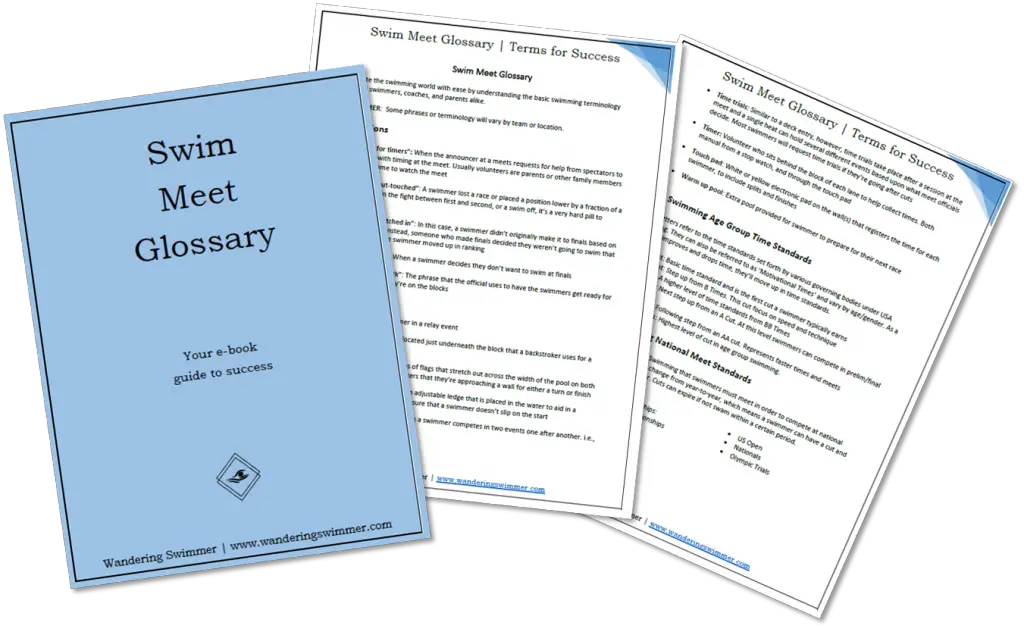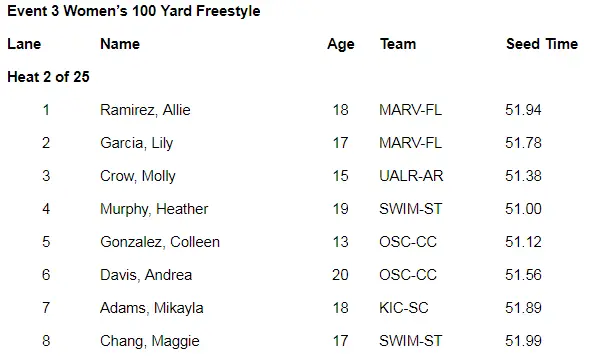Swim Meet Terminology
Knowing some swim meet terminology, or swim meet terms/lingo is key to surviving any swim meet. Without it, you run the risk of missing a race or doing something incorrect.
But where do you start and which ones should you know first?
Here are 23 quick, but important swim meet terms to help you find success at a swim meet!
Related articles:
Disclosure: This post may contain affiliate links, meaning we earn a small commission at no cost to you if you purchase something through one of our links. As an Amazon Associate, we earn from qualifying purchases. Please check out our disclosure page for more information.

Want to know dozens of swim meet terms? Download my free mini e-book below for a comprehensive swim meet glossary that you can reference whenever you want!

General swim meet terms
To start, let’s cover some basics!
You’ll hear most of these terms either throughout the meet, from the coach or other swimmers. You might read them in the meet information, as well.
Related article: What to Bring to a Swim Meet
These swim meet terms describe the swim meet and how it will run.
- General Warm-Up: When the main competition pool is open for all swimmers to get into the water to prepare for the meet
- Heat: Separates swimmers in an event and is comprised of 6-10 swimmers (based upon how many lanes are available). These swimmers are typically grouped together by similar times, ensuring that those of close speed/time can race against each other
- Heat sheet: A packet of paper – or a few sheets, depending on the size of the meet – that lists out the order of events, and includes the heat and lane assignments
Related Article: How to Read a Heat Sheet

- Meet Information: Packet of information found either online or at the pool that details specific and important information about a meet. Time standards, dates, times, and rules can be found within this packet
- Officials: Designated individuals who watch swimmers during a competition to ensure that swimmers complete all races legally
- Order of Events: List provided in the meet information that provides the number and order for each event at a meet. Note that the order can be different per meet
- Psych sheet: This form lists all the swimmers in each event from fastest to slowest. It’s a good way for swimmers to gauge where they’re at in the meet and what the competition looks like
- Seed Time: Time at which a swimmer is entered into the meet. Usually, this is the fastest time a swimmer has gone in that season or in their life that’s registered with the swimming database
- Swim Meet: Place where swimmers compete against each other and the clock to better their times and earn cuts
- Timer: Volunteer who sits behind the block of each lane to help collect times. Both manual from a stopwatch, and through the touchpad
Race and pool specific
While pools may vary in shape and size, most pools will have the same pieces of equipment in terms of racing. You’re probably familiar with some of these terms from your own pool!
The below swim meet terms as specific to meets and you’ll hear them used frequently on deck.
- Blocks: Stand that swimmers use to dive into the water at the start of the meet
- Cooldown pool: Extra pool provided for swimmers to help muscle recovery after finishing a race. Can also be located in the diving well. Also known as a warm-up pool
- DQ: Disqualification of a swimmer through either false starting, illegal turn, or stroke
- Event: Name and number of the race
- False start: When a swimmer moves on the block or leaves the blocks before the starting sound
- Starts: Action of diving into the water at the start of a race
- Splits: Times collected during each turn of a race
- Touch pad: White or yellow electronic pad on the wall(s) that registers the time for each swimmer, to include splits and finishes
- Warm up pool: Extra pool provided for swimmer to prepare for their next race (also known as a cool down pool)
Related article: How to Have a Better Swim Meet
Relay specific
Relays fall under a unique category at swim meets.
- A Relay is a team comprised of 4 swimmers who each race a different leg of the race. Relays can vary in length from 200 – 800, with each swimmer racing the correct distance
You can find more relay specific definitions in the below Swim Meet Glossary.
Expressions
No swim meet would be complete without a list of some common expressions. While not swim meet terms per se, they’re still useful know!
- “Call for timers”: When the announcer at a meets requests for help from spectators to assist with the timing at the meet. Usually, volunteers are parents or other family members who came to watch the meet
- “I was out-touched”: A swimmer lost a race or placed a position lower by a fraction of a second. In the fight between first and second or a swim off, it’s a very hard pill to swallow
- “Take your mark”: The phrase that the official uses to have the swimmers get ready for a race when they’re on the blocks
In Closing
There you have it! 23 quick but common swim meet terms that will help you survive a day at a swim meet! 🙂
As I mentioned earlier, this doesn’t cover nearly all the different words and expressions that you’ll hear on the pool deck.
If you want a more detailed glossary of swim meet terminology, check out my free Swim Glossary here! Download and print it out, or save it to your phone for quick access.

I hope this brief overview of swim meet terminology helps you find success at the pool. And, I hope it encourages you to keep going!
As always, happy swimming!
-Chevron
Bonus Content:
Best Swim Meet Advice: To help make the most of your next swim meet, we’ve compiled the 14 best pieces of swim meet advice we’ve heard throughout the years.
How to Stay Warm at Swim Meets: Not staying warm at swim meets can lead to bad times and races. Try some of these options to help you stay warm at your next swim meet and race faster.
15 Ways to Extend the Life of Your Tech Suit: It’s no secret that tech suits are expensive. So how do you extend the life of your tech suit? Here are 15 tips to help care for your tech suit.

Want to Improve at the Pool?
Join swimmers and swim parents to receive my free newsletter and receive a free Swimming Glossary e-book as a thanks!
Every month you’ll receive tips and coaching to help you find success at the pool.